|
|
"SOUTH
INDIA VILLAGERS! "
|
"A
CHILD WITH POLIOMYELITIS! "
|
|
|
|
I.
The story of a meeting between Thanappan and Father Ceyrac.
Thanappan
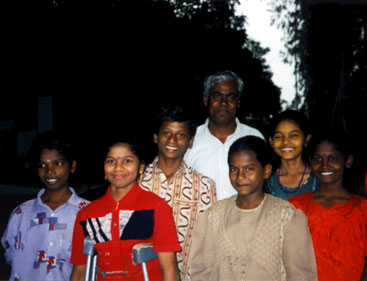
Thanappan,
a very clever man, lives in the South of India. He is in charge
of an important project of rural development and of a house for
children with poliomyelitis. He reports here, without affectation,
his childhood and his encounter of Father Ceyrac.
I met a very noble man, by virtue of his simplicity, his kindness,
his love and affection, always thinking of the others, especially
the poorest, the street children, the lepers and the children suffering
from polio; his name is Reverend Father Ceyrac.
I met him in 1968, at the age of 13, in my village, Vedanthangal.
At that time, I was assisting a Scottish nurse, Elisabeth R, Maclean,
as a translator for the sick.
I come from a poor family. My father, a carpenter, had to feed 9
kids. With his low salary, we hardly had one meal per day. These
are difficult memories. Father Ceyrac paid for my schooling and
boarding. After college, I wanted to stop studying, so I asked Father
Ceyrac to help me find a job, which he refused, wanting me to go
on with my studies. Yet, aware of my motivation he sent me to various
Indian states, among associations he was in charge of, in order
to improve my knowledge.
I finally arrived in Manamadurai in 1981, to continue the "Thousand
Wells" operation. At that time, Father Ceyrac was in refugee
camps in Thailand. He came back only in 1993.
I am particularly glad and proud to work for him. The French Government
awarded him with the title of Chevalier of the Legion of Honour
for his social activities. It is true that he devoted his life to
the people of India. I don't know anybody who can replace our Sami
Ceyrac.
II.
A vast rural development and educational support operation
A. THE PROJECT
Thanappan, Father Ceyrac
and the children.
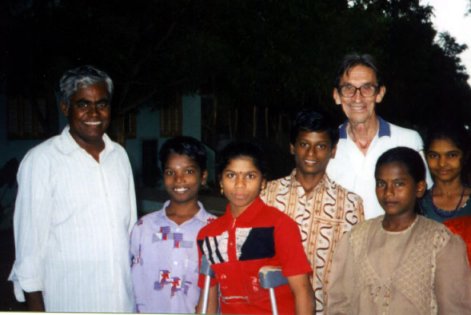
Father Ceyrac sheds the light now on the stake of the "thousand
wells operation", which was at the root of a wide rural development
plan.
1) At the beginning,
in 1975, the Thousand Wells operation…
" The farm extension happened in the 1970's through the Thousand
Wells operation, (…). The great value of this operation comes
from the fact that it originated from the base. All the great changes
started from the base (…). As of now, within 30 years, we have
dug 1 120 wells"
2)…the beginning of a unification and
awareness movement in the villages
"To get a clear idea of this operation, 100 wells mean water
for 50 000 people and 1 000 mean water for half a million people.
The most interesting aspect of this formula is its simplicity. It
includes 3 conditions: the well must be dug on a community land,
never on a private land. Indeed, digging a well on a private land
means favouring some people only and thus increasing the gap between
the rich and the poor. Second condition: one well per village, and
not per caste. We completely refuse to have one well per community
or caste. The well unites, never divides. Third condition: the villagers
themselves should dig it. If you want a well, you have to dig it,
but we will help you.
The well becomes an instrument of awareness. First step: make people
understand that the well belongs to the whole village. Nobody should
get richer at the cost of others. Second step: " We are all
brothers", the fact that there are higher and lower castes
does not mean that the lower cannot drink the higher's water. Every
man is equal to God as well as the others. Water belongs to everyone.
Third step: regarding work, work value, community work. We can
fight poverty only if we work together, and that's where the cooperatives
come in. If we all work together, we can manage!
To dig these "Thousand Wells", people had to stop their
usual work. We thus had to offer a salary to them so that they can
support themselves. At the beginning, we had asked them to fix their
own salary. They refused.
Then, during the construction work for the first well we wanted
to dig, we told them: "we offer you the same salary as in Manamadurai
farm: 60 rupees for men and 50 for women". After a village
council meeting, they came to see us and told: "It is too much,
half is enough." I couldn't believe what I'd heard."
3) Today: 120 villages towards rural development.
Thanappan, présent au quotidien sur le terrain au contact des
villageois, nous présente son action, qui passe par le micro-crédit
et soutien scolaire.
Girls from a slum walking
to school
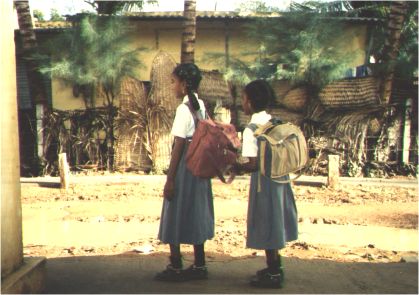
Our aim is to help men to go towards rural development. We want
all the villages to get out of poverty and illiteracy and "walk
with bravery and courage". We bring our support to farmers,
small "harijan" farmers as well as to 120 villages amongst
the remotest and most exposed to severe droughts in Tamil Nadu.
We also wish to create unity between them.
We started our action in 1975, based on the reports of many villages
regarding the severe drought they were experiencing and their inability
to get drinking water.
A team, led by Father Ceyrac, thus started the "Thousand Wells"
operation. We created 1 130 drinking water wells, which contributed
to increasing the villages' standard of living. Subsequent to this
action, we now help the villages solve all kinds of problems so
that they can develop socially and economically. We train the small
farmers and encourage women to organize themselves in collectivities.
At all levels, they try, together, to solve various problems such
as street lighting, the cultivation of unproductive lands, the creation
of alternative jobs, fighting against the injustice of the caste
system… We help them get governmental supports such as the
IRDP and the PMRY, support for employment or any other socio-economic
development support. All these actions radically change their living
conditions. We helped them to "stand up", they now have
to "walk".
1. The miracle of micro credit:
Thanks to our support, the village's collectivities get financial
support from the Government and national banks for purchasing milk
animals, muttons, agricultural devices, and small shops for the
cottage industries. We thus created cooperatives of mutton breeders,
80 milk industry cooperatives and about 20 micro credit associations
managed by women. We request the banks to finance them. We take
care of the loans, associated to the village communities.
Our aim is not to act as bankers but to vouch for the credit the
villagers need in order to develop; most of them being too poor
to be trusted by the banks. Far from making them dependent, we make
them legally responsible for their initiatives. The bank gives them
2 years to reimburse their loan. Most reimburse within one year.
As of now, all were able to pay off their debts.
We also organized a savings program with the women so as to enable
them to borrow to support themselves.
2. 2. The successful school support:
Yearly distribution of
school books
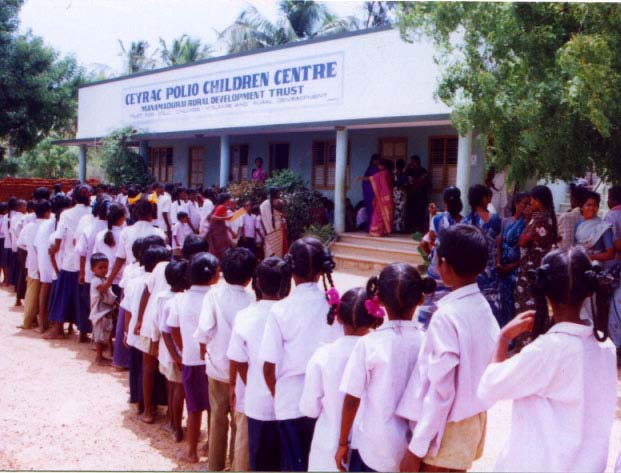
Because of the dowry system and its cost, we realized that most
women were illiterate. They thus don't see the value or the necessity
of school and send their kids to work. However, we think that a
key to development is the promotion of education. We thus implemented
an adults training program that interested particularly women. This
success encouraged us to extend our actions to children by allocating
the responsibility of supplementary classes to women. Not only do
we undertake some expenditure (books, notebooks, uniforms…)
but we also follow the children's educational evolution. Today,
1 200 children are enrolled in 15 villages. It is just a beginning…
B.
THE NEEDS
We would like to have temporary volunteers to take
part in the rural development activities.
We also need a doctor for the villagers.
Finally, we need a more substantial financial support.
C.
TEMOIGNAGES
...
III.
HEALTH CENTER FOR CHILDREN SUFFERING FROM POLIO
A.
THE PROJECT
A child from the center
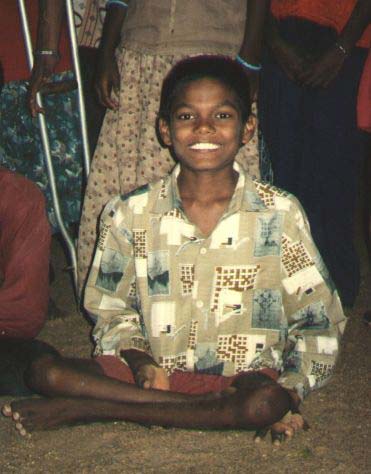
1) At the beginning 1995…
We started our action in 1994. Father Ceyrac had met a boy suffering
from polio near the AICUF farm village. He immediately requested
me to take him to a doctor and do the needful. The child, Karuppayah,
underwent an operation in Madras and is now able to walk, but only
with prosthesis because the operation was performed too late. "You
have arrived 7 years late", the doctor told us. Our reply was:
"Doctor, next time, we will not come 7 years late". We
thus launched the project of a center for children suffering from
polio.
We are now helping 40 children and our aim is to increase this number
to120. We provide them with medical care, food, education and we
train them to work so that they can "stand up and walk"
on their own in the future. As far as I know, we are the only specialized
center for children suffering from polio in Tamil Nadu.
2) What is polio…
Polio is a disease that affects children at birth and deforms their
bones throughout their growth. They are thus unable to walk. This
disease mostly affects children below 10.
Polio in India
Once affected by polio, children are rejected by their parents.
They are completely neglected. However, these children should immediately
taken care of by competent medical personnel and given treatment.
But, having been neglected by their parents, they quickly lose confidence
in life and usually end up begging in the streets.
The percentage of people suffering from polio in India is 0.45%.
It is 0.6% in Tamil Nadu. In Sivagangai district, 21 000 people
are affected; however, only 6 000 of them are taken care of by the
Government, the others are left without any help.
B.THE
ORGANIZATION
Every year, in December 10 to 15 children are operated on in Madurai
hospital. After the operation, there is no anaesthesia in order
to keep the children's nerves alive. It is the necessary condition
for them to have a chance, after such a terrible operation, to be
able to walk. The children stay in the hospital for a few months
before returning to the center; at that time, they are still unable
to walk. Their legs are like bamboo, supported by prosthesis, which
they have to muscle and patiently rehabilitate despite their suffering.
That's how, every evening, after school, all do their movements.
The will power, patience and solidarity of these children is extraordinary.
They accept pain with the hope that they will be able to walk one
day and help each other for their rehabilitation exercises. Out
of 15 children operated in 2000, 9 will finally be able to walk.
Once they can walk, the children go back home. The less lucky ones
will have a wheel chair and get trained to use tools such as computers
that will enable them to do sedentary work.
C.
THE STAFF
Thanappan supervises the whole activity of the center. He works
with Agnes, an unmarried 28-year-old girl who lives with the children.
She prepares their meals, looks after them, supports them, and gets
up in the night when they are sick. She is a sister to them, "akka"
(big sister in Tamil). She shares her experience with us:
Agnes
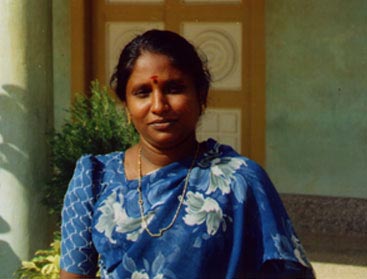
"We live here like members of the same family, though we all
come from different backgrounds. This unity is due to Thanappan's
efforts, supported by Father Ceyrac, and makes our project a success.
I just brought a little stone to the project. I am glad to be here.
In my early days, I was in a boarding school. After I completed
my studies, my mother asked me what I wanted to do. I thus told
her I wanted to work in a public boarding school or an orphanage.
However, I was not accepted in a government institute. That I why
I joined father Ceyrac's polio center on November 17th 1997.
Sometimes, children can be difficult to manage and I thus have to
be severe. This does not last long and quickly gives place to a
family, solidary atmosphere, thanks to Father Ceyrac's benevolent
presence and Thanappan's sense of responsibility."
D.
NEEDS
We need a doctor, a nurse or a physiotherapist to take care of
the children.
We also need more substantial financial support.
E.
THE BUDGET.
BUDGET FOR YEAR 2000 FOR 50 CHILDREN:
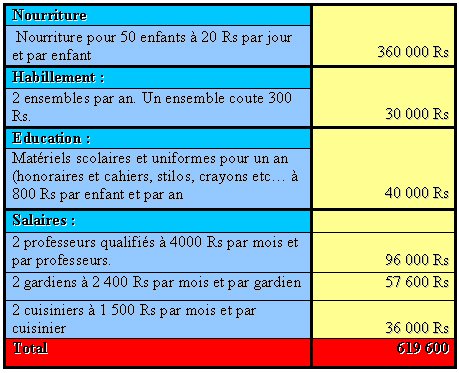
BUDGET FOR YEAR 2001 FOR 50 CHILDREN:
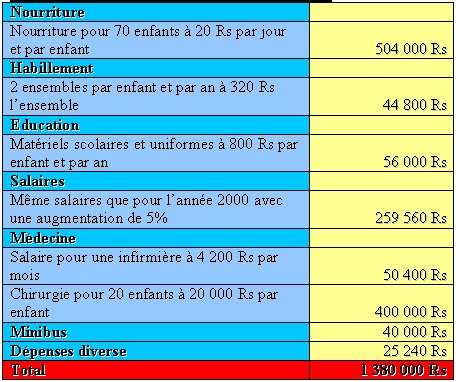
BUDGET FOR YEAR 2002 FOR 50 CHILDREN:
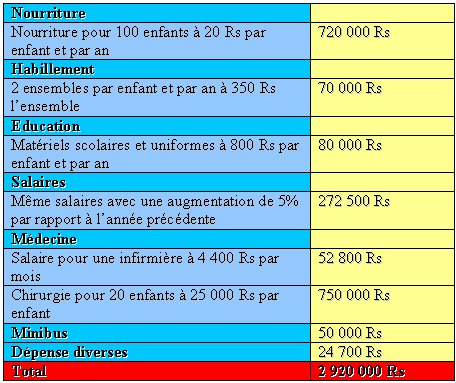
IV. The future goals
§ We want to eradicate illiteracy for the new
generation.
§ We want to provide the poor with a reasonable standard of
living, so that they "stand up and walk" on their own,
thanks to savings.
§ We want to create unity amongst people and a casteless society.
§ We want to promote the women's solidarity in the rural areas
to help them fight against the dowry system.
§ We want to help the children suffering from polio to have
a better life and support themselves in the future.
|


